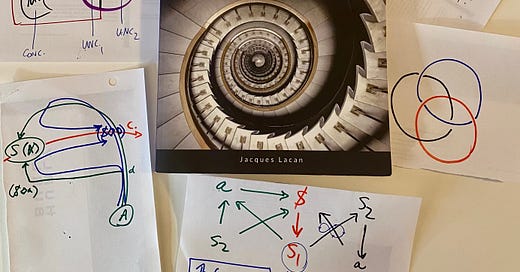Friday’s final session on Seminar XXI was truly epic. Five hours of brilliant questions, summative insights, and tireless writing. Here are some of formulas and diagrams that were strewn across my desk by session’s end:
To start, note the bottom diagram. It’s designed to show how most non-dupes err — but also how they can learn to err differently, more fruitfully, along alternate paths of psychoanalytic inquiry. Where capitalist non-dupes were, properly analytic dupes become.
But it’s the top-left diagram that still catches my eye — if only for its sheer clarity. Lacanian psychoanalysis begins with something of the one (an imaginary construct), deciphers it into two (via symbolic logic), then counts three in between (an irremediable division which touches on the real).
And voilà, the sexual relationship which is not such thing that Lacan never tires of discussing. But also, more importantly, his return to love in this period. Not narcissistic love, but its more profound sibling — the kind of love which consists in “giving what you don’t have.” Or, as Lacan calls it in Seminar XXI: “good love.”
What does “good love” look like? On this point, Lacan is clear: When good love occurs between speaking beings, we see “two half-sayings that do not overlap,” he explains. “It is the connectiveness between two knowledges insofar as they are irremediably distinct.”
Wait: Half-sayings? Between two knowledges? Characterized by irremediable division? You know where he’s going with this! “Love is the truth,” Lacan continues. “But only insofar as it is starting from it, starting from a cut, that there begins a different knowledge than propositional knowledge, namely, unconscious knowledge.”
At which point, much of what we learned in Seminar XXI begins to come together. Between the cut I am and the cut you are is the cut we share — a cut whose measure we experience as “good love.”
Which is partly why, in the wake of Friday’s concluding discussion, I can’t help but feel especially grateful for the diverse group of scholars, clinicians, students, trainees, and independent learners that made this series possible. Angelica, Asaf, Benjamin, Bruce, Chloe, Cody, Dieter, Ellie, Eric, Fernanda, Frank, Geo, George, Gwen, Hamza, Henafi, Henrik, Holly, Joanne, Joel, Jonathan, Jordan, Kelci, Kolya, Lea, Maeve, Molly, Oliver, Pushpajith, Rachel, Sandy, Scott, Shyra, Stamatia, Suhrida, Svetlana, Taylor, Terence, Tiffi, and Yehoshua — thank you for making good love the central theme of our spring series!
And if you’re wondering what’s next for Lectures on Lacan, as spring gives way to summer, don’t think R., S., or I., but consider this instead:






What’s next ?